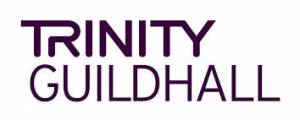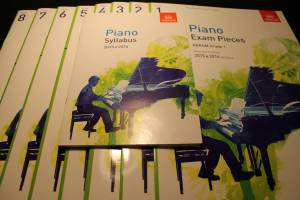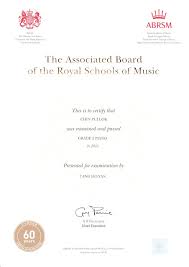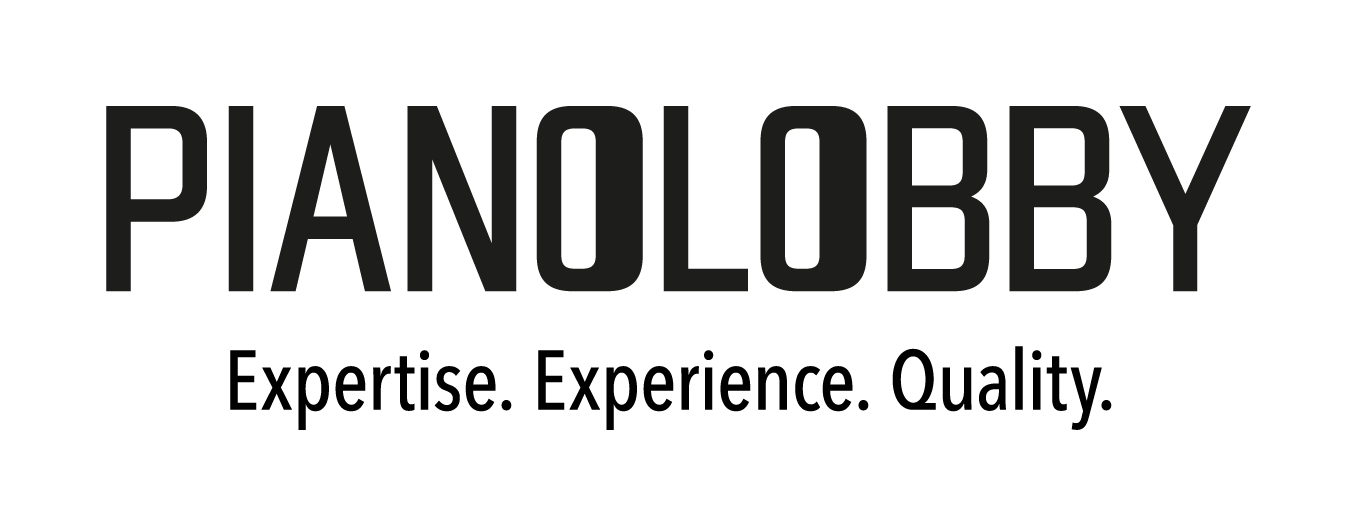WHY TAKE MUSIC EXAMS?
‘Enjoyment through achievement’ say the ABRSM, gaining a ‘certificate is a rewarding experience’ they continue.
There are a number of exam boards, the ABRSM is the biggest, followed by TrinityGulidhall and then the London College of Music. They each broadly offer a variation of the same. The ABRSM (The Associated Board of the Royal Schools of Music) is an organisation set up to establish educational standards for instrumental and vocal performance. The Royal schools are: the Royal Academy of music, Royal College of music, Royal Northern and Royal Scottish Academy of Music and Drama. Each year over 620,000 people take its exams in 90 countries. There are 8 grades and then beyond this, diplomas. The exams can be taken at any age and are for any classical instrument or voice. 

But, what is a music exam?
The structure is the same throughout the 8 grades.The technical aspect consists of scales, broken chords and arpeggios. Scales start out hands separately over 2 octaves in simple keys, eventually becoming hands together over 4 octaves in all keys.
Next comes 3 pieces of music. For the ABRSM the first and third pieces are quicker in pace with the middle piece is slower. They cover most musical eras as well. They grow in complexity and length as the student goes through the grades. Then there is sight-reading and lastly aural tests.
There are definite benefits of taking these exams. It is a reward for all the hard work of the student (and of course the parents and teachers). They can be a motivational tool, a way of measuring personal progress, a performance opportunity, a focus for working, experience of playing in front of someone different and I think most importantly, feed-back from an independent and highly skilled, trained musician.
It is certainly not necessary for all students to follow this path, and some certainly do not thrive when under such pressure. Even the ABRSM points out that ‘Music exams do not suit everyone and exam syllabuses are not intended to provide a complete curriculum or choice of repertoire to the exclusion of all other music.’ This is a very important point. If a student takes every grade and only learns exam pieces that totals only 24 pieces of music. That isn’t a full and rounded education. It is essential to work on technique and to learn repertoire in all styles. 
There are also a number of vital skills that examinations do not test. One of the most important parts of being a musician is playing with other people. Keeping in time with others, playing in the same style as others, playing in tune with others, watching and obeying the conductor, being able to perform with confidence in front of an audience are all essential skills for a musician, and none of them are tested by examinations. 
It is easy to get bogged down with examinations. They are simply tests that give you a target to meet that will reassure you that you are moving forward. Do them when you feel the need. It doesn’t have to be every year and is it perfectly ok to miss out exams.
Consider also that grade examinations are now part of the National Qualifications Framework and are of equal merit to all other qualifications. The grades are seen as being broadly equivalent to GCSEs and A-levels. Grades 1, 2 and 3 equivalent to GCSE grades D to G, Grades 4 and 5 equivalent to GCSE grades A* to C, and Grades 6, 7 and 8 equivalent to A-level.
All this is very well, but why put yourselves through all this? As a student I don’t think I was ever really sure about why and the suggestion to do exams came from my teacher. Music exams were just done because that was the thing to do which isn’t necessarily the best reason. I was happy to get that piece of paper as proof of what I was capable of doing. I now think that the way to use exams is for feedback on playing pieces. 

One of my customers at Pianolobby was chatting about her piano skills and described herself as an ‘80% pianist’ She explained that she would work on a piece until she was able to give a good approximation of it and then always running out of steam to really perfect it. She was upgrading her upright piano as a way to feel encouraged to play and then use the exam system to really polish up the last 20%. This seems very sensible to me.
From a parents point of view, it is an effective way of having evidence of progress. A parent of a child I teach admitted that he is much more committed to getting their children to practise when there is an exam to work for. That deadline has a way of really focusing the mind. As a teacher I then hope that those habits last when they are working on the repertoire pieces that follow on from exams.
They are useful for children too, if it is all explained properly. It can give them a sense of working toward something, getting that certificate to hang on the wall is fun, it’s often the exam pieces that are the ones that are learnt to performance standard giving a sense of pride when they know they can play pieces well.
I seem to have gone around in circles a bit. Exams can be useful, but they can’t address everything, things such as technique, a full repertoire, ensemble playing and so on, but that is the role of a good teacher. They are good for stimulating practice, perfecting pieces, useful markers of progress and learning to work towards a goal. Exams I think need to be seen as just one thing that is added into the mix of a musical life, musical education and musical experiences.
I hope this doesn’t put anyone off tackling exams, but perhaps to have more thought as to why you are sitting that exam.
Thank you for reading.
Julian


Add Comment